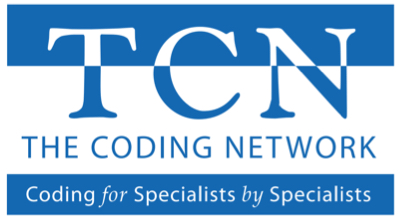Orthopaedic Surgery Coding
Orthopaedic Surgery Coding Services Overview:
The Coding Network considers Orthopaedic Surgery Coding to be four separate coding specialties: general orthopaedics coding (inculding sports medicine coding and total joint replacement coding,) spine surgery coding, hand/upper extremity coding, and foot-and-ankle surgery coding (podiatric surgery coding.) We believe that to be competent in coding for a subspecialty, the coder must do it every day. Consequently, we require our orthopaedic surgery coders to focus only on orthopaedic surgery; we don’t even allow them to code the E&M services provided by our orthopedists. All of our coders live-and-work in the United States. Each of our orthopaedic surgery coders must have a minimum of three years of orthopaedic surgery coding experience and must pass our very demanding proficiency tests for those orthopaedic coding subspecialties. We have a separate test for each orthopaedic surgery coding specialty. Unlike the basic coding certification tests which are largely multiple choice questions, our specialty-specific coding proficiency tests are actual de-identified operative reports from our tertiary orthopaedic surgery subspecialists. The few who pass must demonstrate an accuracy rate of at least 95% on our ongoing random Quality Assurance/Continuous Accuracy Improvement reviews in order to continue working for The Coding Network.
Compare The Coding Network’s approach to quality to the majority of our competitors, both domestic and in off-shore “third world” countries; their business model is to offer would-be coders a vocational “trade school” experience designed to prepare them for the certification test. Once they pass, they are placed within that company to code for you. It’s the equivalent of having an intern perform brain surgery!
Many surgeons believe that nobody knows better than he/she what was done in the operating room, “so I’m the best one to code it.” The first part of that sentence is correct, but does not logically lead to the correct conclusion. Coding is dynamic; does that surgeon know that just the 2010 NCCI data set includes 24,060 new active pairs and 19,083 terminated pairs (237 were terminated retroactively to 1/1/09) and 869 modifier changes, and 5,299 swapped pairs? The 2010 CPT expanded the Musculoskeletal System subsection to include new guidelines defining excision of subcutaneous, fascial, and subfascial soft tissue tumors and radical resection of both soft tissue and bone tumors codes. It includes 41 new codes, 53 revised codes, 7 deleted codes, and new parenthetical notes and orthopaedic surgery procedural coding instructions. To make orthopaedic surgical coding even more complicated, the AMA decided to assign CPT code number that are not sequential with some “families” of codes. That doesn’t even touch the many annual and quarterly changes to the ICD 10 coding system. Coding can not be cavalierly considered as simply an “afterthought” to performing an operation. Like being an orthopedist, orthopaedic surgery coding is a career of its own.
The Coding Network’s Orthopaedic Surgery Coding Division
- Directed by a nationally known surgical coding expert.
- Decades of experience in orthopaedic surgery coding for academic and private practices.
- Team of certified orthopaedic surgical coders each with a focus on orthopaedic subspecialties.
- Experience in coding for orthopaedic surgeons in 49 states.
Surgical Coding Needs
- Well trained orthopaedic surgery specialty coders are difficult to find, expensive to recruit, and their ongoing “care and feeding” can be quite costly.
- Few certified coders have the extensive orthopaedic surgery coding experience and specialty knowledge possessed by The Coding Network’s staff of orthopaedic surgery coding experts.
- Orthopaedic surgery coding, particularly spine surgery, is among the most complex coding of all. It presents a unique set of challenges with levels, interfaces, vertebrae, and instrumentation that are totally unlike any other subspecialties.
- Coder turnover creates cash flow peaks-and-valleys.
- Smaller orthopaedic practices can not always cost-justify a full time certified coder. They are an expensive overhead item who often use their highly paid time on other less-challenging non-coding tasks.
- There is no such thing as a “mulligan” when submitting Medicare and insurance claims. They must be accurate the first time. The legal and financial risks of upcoding or undervaluation are enormous.
TCN’s Orthopaedic Surgery Coding Solution
- The Coding Networks surgical coders are “black belts” in each individual subspecialty within the entire spectrum of orthopaedic surgery coding. We offer you coders specializing in:
- General Orthopaedic Surgery Coding, including Sports Medicine, and Total Joint Replacement.
- Orthopaedic Spine Surgery Coding.
- Hand and Upper Extremity Surgery Coding.
- Foot-and-Ankle (Podiatric) Surgery Coding.
- 2-to-3 business day coding turnaround via HIPAA + HITECH compliant secure email, overnight courier, or fax. We can remotely dial into your electronic medical record or transcription service’s archives.
- HIPAA and HITECH compliance and no documents are sent off-shore.
- Our per-case pricing model is inexpensive and our team of coders stabilizes cash flow. You only pay for what you need. Never worry about revenue cycle “whiplash” caused by absences, vacations, family leaves, etc.
- No monthly minimums gives you total control.
- Volume-driven pricing makes us an ideal ongoing solution for practices of all sizes.
- Identification and feedback of documentation deficiencies at no additional cost.
- A practical and cost-effective solution for your orthopaedic surgery coding needs.
- No monthly minimums.
Services
- Ongoing day-to-day coding.
- Temporary orthopaedic surgery coding to cover vacations, medical leaves and employee turnover.
- Backlog coding resolution services.
- Coding accuracy audits with user friendly and educational report formats to identify both compliance exposure and missed revenue opportunities.
- Documentation training services with subspecialty workbooks..
- Coding “helpline” services.
- RAC and OIG audit defense.

Latest Blog Posts:
Coding Compliance Audits: Uncovering Deficiencies and Solutions
In an era where healthcare systems are intricately tied to digital platforms, meticulous coding accuracy cannot be a mere afterthought; it is an absolute necessity. Often overlooked, coding errors are the silent killers of compliance [...]
Outsourcing Medical Coding: The Key Advantages for Healthcare Providers
Amid the complex labyrinth of healthcare administration, one area stands as a beacon of efficiency and cost-effectiveness—outsourcing medical coding. It brings an exhaustive list of benefits ranging from unburdening clinicians, reducing compliance exposure, minimizing claim [...]
HCC Coding Compliance: Avoid Revenue Loss and Fines in Healthcare
Navigating the complex labyrinth of HCC coding is a daunting task for healthcare providers due to the frequent carrier changes to rules and regulations, and non-compliance could mean substantial revenue loss and hefty fines. In [...]
Medical Coding Audits: Ensure Accurate Clinical Documentation
Why Conduct a Medical Coding Audit Medical coding audits ensure accurate clinical documentation, improve revenue cycle management, minimize revenue loss and coding liability, and maintain compliance with industry regulations. Improved Accuracy of Clinical Documentation Accurate clinical documentation [...]




